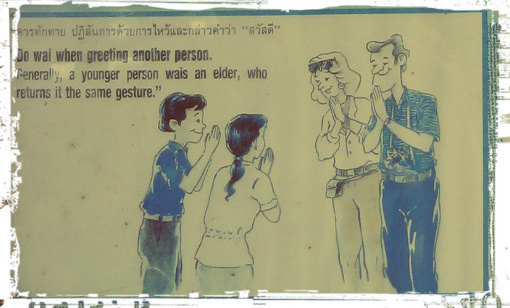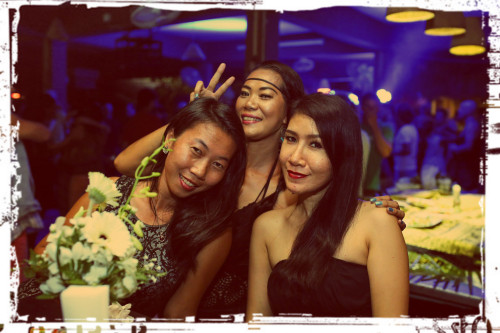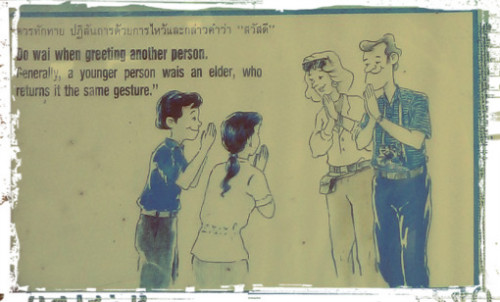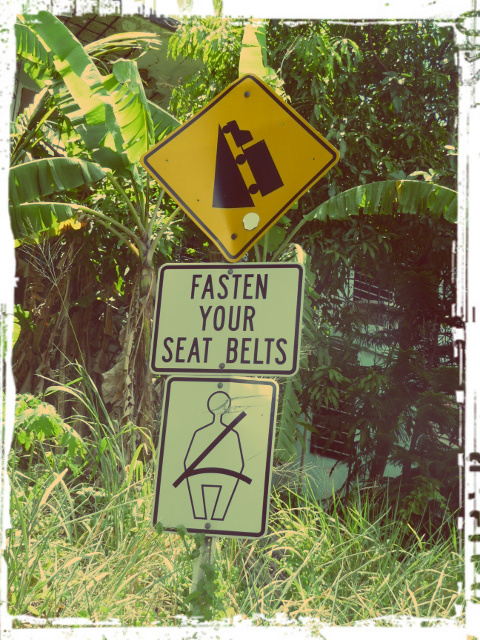Sawadee khaa ladies,
My name is Myriam, but everybody on my rock calls me Myr (or Mia, Miii, Minh… the list goes on). In Thailand, everyone has a nickname. Thai people only use their real/given names for official paperwork and thus, nicknames are so common that most people don’t even know the real names of their closest friends.
Nicknames are given at birth and often have a story behind them. I’m guessing my friend must have put her mom through a lot of pain during labor as she got the nickname, Boom. I also know a guy nicknamed, Coke – he was apparently very dark-skinned at birth, hence the soft drink association.
In my neighborhood, there are twins with the nicknames Lek (little) and Ouan (fat). I know people called Nu, Bo, Pla, Nui, Noi, Out, Kup, Nup, Ta, Two, Ning, At, Boat, and – wait for it – James Bond. Yes, his parents actually gave him the nickname of James Bond. That’s his first name. With the Thai accent, it sounds more like “Gembon” but James Bond himself makes sure that his name is always pronounced correctly. And no – it’s never just James or just Bond, it’s James Bond!
Apart from some exceptions, most Thai nicknames are very short and preferably do not contain the letters “R”, “V”, or “L”. There is a good reason for that.
Take my friend Val, for example. When she first moved to Koh Phangan, it became immediately clear that Thai people would never be able to pronounce her name correctly. So it went from Val, to Wawl, and ended up being Wow. How great is that? You move to a tropical island and you get to be known as Wow. Talk about an ego boost!
The story behind my nickname is unfortunately not quite as glamorous. Myr is the word for “wife” in Thai. Myr-iam actually means “second wife”, “the mistress”, or, more literally, “the wife you fuck”. Of course, it does depend on how you pronounce the words, as Thai is a tonal language. Each syllable is pronounced with one of the 5 “distinct” tones: middle, low, falling, high, or rising. So basically, the same word can have 5 different meanings. I didn’t want to take any chances with how my name might be interpreted, so I just have everyone call me Myr to be safe.
I’m ashamed to admit that even after 5 years on this rock, my command of the Thai language is bad… really bad. Though in my defense, it’s not for lack of trying. Thai is haaard! I am normally quite good with languages, but this one is on a completely different level. One thing that makes it so difficult to learn is that Thai does not use the Roman alphabet, but has its own collection of scripts instead that looks like this: ผมหายไปโปรดช่วยฉัน (In case you were wondering, this is not gibberish. It actually translates to: “I am lost. Please help me.”)
The tonal aspect of it adds to the immense challenge. Seriously – can you believe that the same exact word can mean either “near” or “far” depending on the tone you use when you are saying it? Listen to this (click on the speaker icon on the Thai side). Can you hear the difference?
To my horror, I only recently realized that I have been mistakenly saying to people, “You are a bad person” whenever I was trying to ask for their name. Thai people don’t like confrontation or awkward situations, so it took 5 years for someone to finally tell me that I was saying it wrong!
Getting lost in translation is a part of everyday life for both expats and locals on Koh Phangan. This island attracts an eclectic crowd of people from all around the world, so most communication is done in English. Since most of us are not native English speakers, you can imagine that conversations can be quite funny and confusing. Just picture a group of Germans, Russians, and French having a conversation in English to give you an idea. Add a Thai person to the group, and you get a whole new language: Thinglish.
Thinglish is an actual thing. It is a simplified form of English used by Thai people. There is no (or little) verb conjugation, unusual pronunciations, and other grammatical anomalies. For example: “Him go s-koon with she yesterday.” (He went to school with her yesterday.)
English words starting with an “S” followed by a consonant are very difficult for Thai people to pronounce, so they make the sound “ssss” followed by the rest of the word: “Sss-mile”, “Sss-pain”, “Sss-pecial”, and, my favorite, “Sss-trawberry” (same word in Thai). This one still always cracks me up 5 years later!
Another particularity of Thinglish is the use of Thai particles at the beginning or at the end of English sentences. Fortunately, I’m very good with these. It actually saves me from looking like a complete loser who can’t speak Thai after being here for so long without actually having to speak the language. “We go to the beach, na?” (to give a suggestion or ask a question). “Khun Sa is here laeo” (“Miss/Mr./Mrs. Sa is here already“).
But if there is one Thai word a woman should know, it is kha (for men it’s krub). This word can be used in ANY circumstance to make you sound like a local. It’s normally added at the end of a sentence to make it polite. For example: “I’ll take this one, kha.“, “I’m going to the pier, kha.“, “How is your familly, na kha?”, and even “Thank you, kha!”
Kha/ krub can also be short ways to say “yes”, “sure”, “you’re right”, “I understand”, “hello”, “goodbye”, or “thank you”. So, as I’m sure you can imagine, I use this word like there is no tomorrow! It’s so easy and widely used that I don’t even say “yes” anymore. Even with my partner.
Whenever I go back home to visit my family in Canada, it always take me a few days to lose my Thai habits like saying kha all the time, greeting or thanking people with a wai (Thai salute), putting toilet paper in the garbage instead of the bowl, eating rice in the morning, smiling at all strangers, and so on.
It’s a beautiful crazy funny frustrating colorful simple life I’m living on this rock – and I love it!

View from the office
What about you? Do you have a nickname on your rock?
Any other women comedically struggling with the native language on their island?


















2 Comments